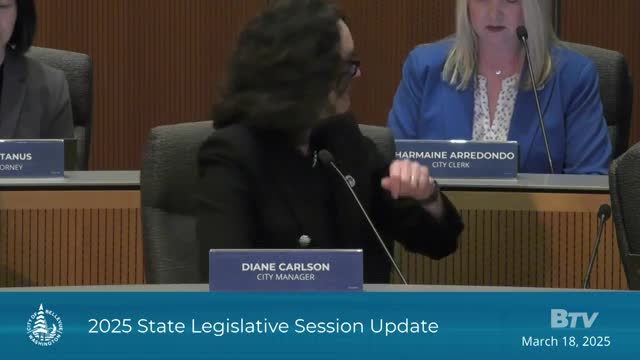Bellevue receives state legislative update as lawmakers confront large budget shortfalls
Get AI-powered insights, summaries, and transcripts
Subscribe
Summary
City staff briefed council on state legislative priorities, infrastructure and Grand Connection funding requests, and a revenue forecast showing a multi‑billion-dollar shortfall that could affect transportation and operating budgets.
Bellevue City Council received a state legislative update on March 18 outlining the city’s priorities, pending bills of interest, and recent state revenue forecasts that showed a significant budget gap.
Assistant Director for Government Relations Katie Halsey and Deputy City Manager Genesee Atkins summarized progress on Bellevue’s 2025 legislative agenda, including funding requests for the Bellevue Grand Connection: a $900,000 request for downtown integration (City Hall Plaza accessibility) submitted through the capital budget process, and advocacy for approximately $50 million for the I‑405 crossing if a transportation funding package advances.
Staff identified several bills under active review or advocacy, including proposals addressing transit-oriented development (House Bill 1491), parking-minimum restrictions (House Bill 5184), middle‑housing implementation, and the Housing Accountability Act (House Bill 5148). Staff also noted several bills that did not advance past the House‑of‑origin cutoff, such as House Bill 1380 (public camping restrictions), House Bill 1195 (shelter authorization on parcels), and House Bill 1443 (mobile housing units). The city is working with regional partners and the Association of Washington Cities to refine language and seek mitigations where bills pose local implementation risks.
Halsey and Atkins reviewed the state revenue forecast released the same day: a projected revenue decrease of about $425 million over four years (compared with the November forecast) and a larger operating shortfall estimated by budget writers at roughly $12 billion (other estimates as high as $15 billion) over four years. The governor’s initial reduction proposals total about $7 billion; House and Senate budget leaders have discussed roughly $6 billion in reductions. The transportation budget faces an estimated shortfall of about $8 billion over six years.
Staff listed revenue options being discussed at the state level that the city is monitoring, including employer payroll taxes, a surcharge on excessive executive compensation, a B&O surcharge, a capital-asset/wealth tax proposal, firearms or self-storage taxes, and transportation-related fees (tire fees, gas tax changes, tolling). The city said it will use a staff-developed framework to evaluate any revenue proposals for fiscal responsibility, competitiveness, and impact on local jurisdictions and taxpayers.
Councilmembers asked staff to return with impact analyses if particular revenue tools gain traction, and several members urged close coordination with regional partners on transportation and infrastructure priorities. Staff noted ongoing coalition work on corridor projects tied to I‑405 and SR‑167 and said they will continue to pursue earmarks and appropriations while preparing contingency plans if requested state funding does not materialize.
Staff emphasized that these discussions are fluid; formal budget proposals and hearings were expected after the March 24 revenue rollouts and committee hearings noted in staff’s timeline.
No formal council action was requested at the March 18 presentation; the session was informational and staff will provide further updates and impact assessments as the legislative process moves forward.
